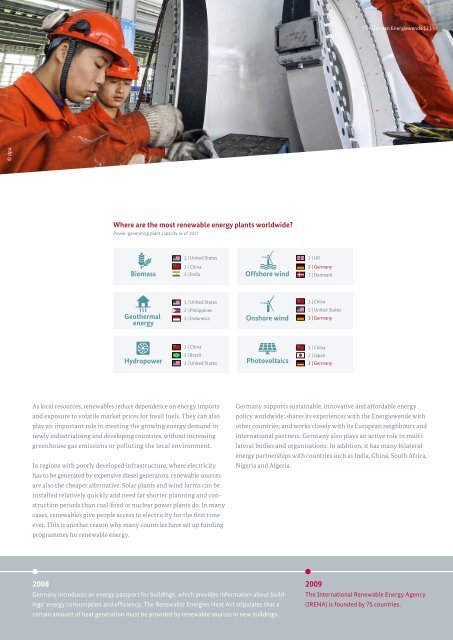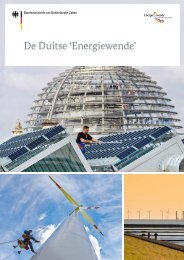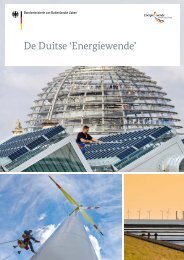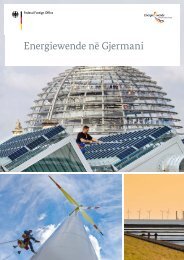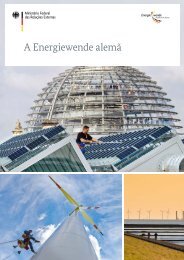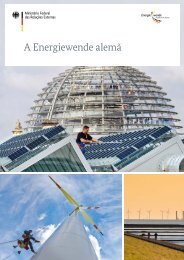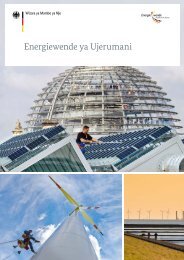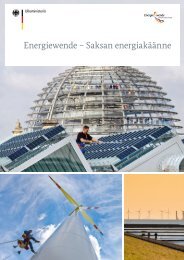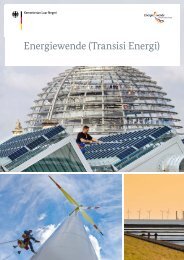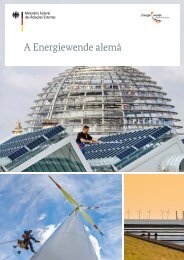The German Energiewende
Create successful ePaper yourself
Turn your PDF publications into a flip-book with our unique Google optimized e-Paper software.
<strong>The</strong> <strong>German</strong> <strong>Energiewende</strong> | 21<br />
© dpa<br />
Where are the most renewable energy plants worldwide?<br />
Power-generating plant capacity as of 2017<br />
1 | United States<br />
1 | UK<br />
Biomass<br />
2 | China<br />
3 | India<br />
Offshore wind<br />
2 | <strong>German</strong>y<br />
3 | Denmark<br />
1 | United States<br />
1 | China<br />
Geothermal<br />
energy<br />
2 | Philippines<br />
3 | Indonesia<br />
Onshore wind<br />
2 | United States<br />
3 | <strong>German</strong>y<br />
1 | China<br />
1 | China<br />
Hydropower<br />
2 | Brazil<br />
3 | United States<br />
Photovoltaics<br />
2 | Japan<br />
3 | <strong>German</strong>y<br />
As local resources, renewables reduce dependence on energy imports<br />
and exposure to volatile market prices for fossil fuels. <strong>The</strong>y can also<br />
play an important role in meeting the growing energy demand in<br />
newly industrialising and developing countries, without increasing<br />
greenhouse gas emissions or polluting the local environment.<br />
In regions with poorly developed infrastructure, where electricity<br />
has to be generated by expensive diesel generators, renewable sources<br />
are also the cheaper alternative. Solar plants and wind farms can be<br />
installed relatively quickly and need far shorter planning and construction<br />
periods than coal-fired or nuclear power plants do. In many<br />
cases, renewables give people access to electricity for the first time<br />
ever. This is another reason why many countries have set up funding<br />
programmes for renewable energy.<br />
<strong>German</strong>y supports sustainable, innovative and affordable energy<br />
policy worldwide; shares its experiences with the <strong>Energiewende</strong> with<br />
other countries; and works closely with its European neighbours and<br />
international partners. <strong>German</strong>y also plays an active role in multilateral<br />
bodies and organisations. In addition, it has many bilateral<br />
energy partnerships with countries such as India, China, South Africa,<br />
Nigeria and Algeria.<br />
2008<br />
<strong>German</strong>y introduces an energy passport for buildings, which provides information about buildings’<br />
energy consumption and efficiency. <strong>The</strong> Renewable Energies Heat Act stipulates that a<br />
certain amount of heat generation must be provided by renewable sources in new buildings.<br />
2009<br />
<strong>The</strong> International Renewable Energy Agency<br />
(IRENA) is founded by 75 countries.


